WYRD - BOX
Concept :
A deck that grows as we play.
Rules that evolve through the game.
How it comes to be :
Entities at the start of a universe.
They decide to play a game.
The universe they create is the game's space.
At first, they will need to make the rules of it.
And they will add things until they interact together.
They will decide to create concepts like time that will let them progress.
With time, the game they made will have enough content to create interesting scenarios.
As they add to it,
they will lose their grasp on how to change the rules and have to play by the rules they decided on.
One day, maybe one of them will find a way to give themselves a lot of power over the game,
and the others might decide to team up against that player.
Afterward, they might decide on rules to limit how rules are made.
With time, they might decide on a set of rules that will let them accumulate power,
or they will put in place things that they will want to win over the others.
They might then try to scheme and fight over those using what is in their universe.
And much more.
Those are all things that could happen in a lot of creation myths.
And those are all things I am really interested in how to translate into something that can be played.
How to make a game that is created by playing.
Starting by playing together and maybe at some point deciding on rules that let us fight over resources,
or maybe ways to role-play as characters in this universe.
With the limit that new rules are to be added from inside the game.
This is the concept at the source of WYRD-OS.
Meant to be a matrix to implement modules, games, mechanics, and ideas on the same table.
And the WYRD Box is one of those modules.
Not the first instance of a WYRD space.
But the first one to be played this much.
I spent a lot of time thinking about the minimal setup for a module as such.
And even tried some that would start from scratch.
It's very fun to do, but quite messy and fastidious.
In the meantime, I started playing Magic the Gathering and decided it would be an interesting foundation for one of those modules.
The Wyrd Box would start with only 4 cards and the bare minimum of wyrd rules to allow us to make it grow and change.
The first WYRD Box started with :
2 - Wyrd Tutor
1 - Recursive Seed
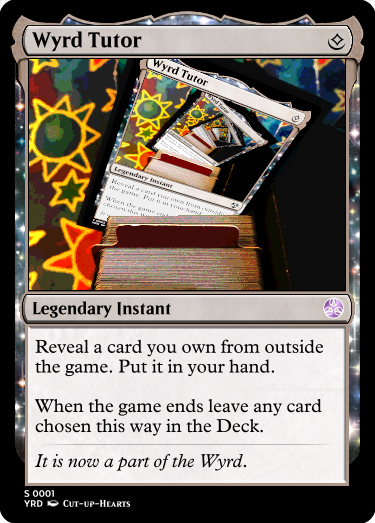
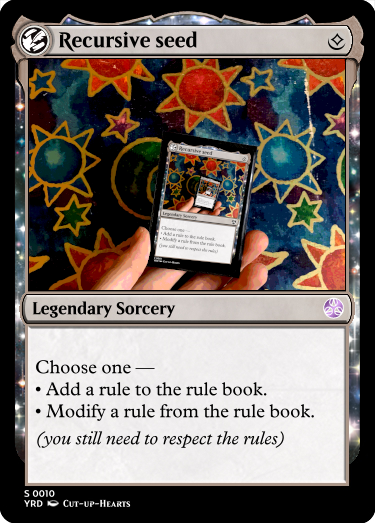
and those rules :
- Magic the Gathering rules are the basis,
rules in this Wyrd Box rulebook modify and add to it. - Library, graveyard and exile are shared between the players
(there is 1 library everyone draws from, 1 graveyard and 1 exile zone)
unless otherwise specified. - Any card can be played face down as a terrain named "Null" with : "tap: add any color or colorless"
This is approximately the recommended "bare minimum"
If you want to go straight into playing your own iteration of the WYRD Box.
Then it's the comfortable minimum to start playing (2 players) and expand as you go.
At first, it feels a lot like writing rules together with your friend and deciding what you want to do with the deck.
But as soon as you have enough cards to play a few rounds before decking out, or a rule to deal with that,
choosing cards becomes a lot more about dealing with a certain situation.
At first, we added cards that were very cheap in mana because we lacked time,
but as the game grows, the situations become more complex.
And as the game grows, the 3 cards that allow us to change the game are more and more diluted.
The game roots itself, and the cards that allow access to it's base code are harder to get our hands on.
Of course, every Wyrd Box will end up developing differently.
And it could also change radically in how it's played.
Sure, we start with what is most akin to a party box,
but we could make the game evolve in a way that allows us to draft the cube.
Or maybe play another game entirely, how could we play poker with it, for example ?
Or would you like to try and turn it into a role-playing game ?
Possibilities are myriad,
but the most interesting part here definitely is about how to make them happen
and how others interact with that.
I found it creates a lot of situations that really stimulate me.
I love solving game-state puzzles or trying to figure out how I could get out of a tricky situation.
Sometimes things happen, and the only way to save yourself is with this one card in the deck ?
Or is it in the graveyard ?
How do you reach it ?
Sometimes there are multiple solutions,
and sometimes you struggle and frantically search amongst the cards you own outside the game
for the one grail that will save you from this board state when you manage to put your hands on a Wyrd Tutor.
The rule book is on paper to be more convenient to read and write when playing.
I'm trying to update a CubeCobra page to share the current state of the deck and rules.
It can be hard to track every change through it, but it can give an idea of what a cube looks like.
I think it's a fun exercise, and I really like how it's going.
I hope I can get other people interested in it.
Or even just try something new, experiment a bit.
I was very inspired while developing it, by cool cubes and concepts, like Dandan or PleasantKenobi party box.
I think cube is a great way to play magic,
and going forward with all that's happenning with Hasbro and wotc,
it's a great way to have fun with the things you like.
And I love finding new uses for cards.
The first WYRD-box
Rules and card list as last updated [09/05/2025]
Card list on CubeCobra
(rules are in both french and english in the rulebook,
when written in french a translation is provided as such {translation}):
- Magic the Gathering rules are the basis,
rules in this Wyrd Box rulebook modify and add to it. - Library, graveyard and exile are shared between the players
(there is 1 library everyone draws from, 1 graveyard and 1 exile zone)
unless otherwise specified. - Any card can be played face down as a terrain named "Null" with : "tap: add any color or colorless"
- Players don't loose the game from drawing from an empty library.
Instead they must shuffle the graveyard and draw from it. - When you add a card to the deck that isn't an mtg card or that needs tweaked rules to fit in this format,
then everyone playing agrees on new rules.
If needed, the person that is responsible for this deck has the final say.
(if you add a card from another game you need to define rules for the game in this deck if those aren't already defined.) - When a spell or ability makes a player draw a card from an empty library,
instead, that player draws a random basic land from outside the game. - Players "own" the cards they send in exile until they leave exile.
- At the beginning of the upkeep of each player,
that player removes one time counter from each permanent they controls and from each spell they own in exile.
When the last time counter of a permanent is removed, its controller sacrifices it.
When the last time counter of an exiled spell is removed, its owner casts it for free. - Pokemon Rules :
- Pokemon cards cost mana equal to the energy up right (so 1 in most cases)
- When a pokemon attacks the controller chooses an attack and the combat phase solves like an MTG fight.
- A pokemon has to defend if able and untapped,
it takes damage that persists after the end of the turn but doesn't retaliate like an mtg creature. - If the pokemon has capacities that aren't attacks
they may be activated by paying the mana cost equivalent to the number of energies required and tapping the pokemon. - abilities that refer to energies attached can be used with equipment or enchantments in mind
- Les joueuses nommées Kali et leurs adversaires ne peuvent pas jouer de Pokémon depuis leurs mains.
{Players named Kali and their adversaries cannot play Pokemons from their hands} - Les joueureuses peuvent à vitesse de rituel, défausser une carte pour :
essayer de capturer le pokemon ciblé sur le champ de bataille.
Cette joueureuse lance un d6, pour un résultat de 3 ou plus elle peut mettre le pokemon dans sa main.
Sinon il ne se passe rien.
{Players can discard a card at ritual speed to :
Try to capture target pokemon on the battlefield.
This player rolls a d6, on a 3+ result they can put the pokemon in their hand.
Else nothing happens.} - [Dons non donnés] n'a pas été donné par Kali (la carte lui appartienstoujours)
{[Gifts Ungiven] were not given by Kali (they still own the card)} - Players can't Mulligan
- Les cartes écrites sur du papier sont considérées comme ayant des bordures blanches.
{Cards written by hand on paper are considered as being white bordered.} - HAPPY HOUR :
entre 19h et 20h il est possible de :
tap tous ses terrains à vitesse de rituel et défausser une carte
pour aller chercher une carte dans la pioche, puis mélangez.
{HAPPY HOUR :
between 7pm and 8pm, at ritual speed players can :
tap all their lands and discard a card
to fetch a card in the library, then shuffle the library} - Thibault et Davy sont dans une relation toxique.
Thibault ne peut pas target ou attaquer Davy.
{Thibault and Davy are in a toxic relationship.
Thibault cannot target or attack Davy.} - les token n’ont pas de cout de mana mais doivent être donnés à une autre joueureuse dans sa zone de jeu.
Ce sont des cartes “normales” (qui peuvent aller en exil, en main ou au cimetière).
{Tokens have no mana cost but have to be given to another player on the battlefield under their control.
Those are "normal" cards (that can go to the graveyard in hand or in exile.)} - Digimon rules :
- digimons are treated as normal creatures
- play cost is mana cost
- [DP] are Defense points
- Digivolve cost is activated ability cost
- The level is the attack
- À la fin de chaque partie la première personne à avoir été éliminée peut choisir une carte dans le deck et l'en retirer.
{At the end of every game the first person to be eliminated can choose a card in the deck and remove it (from the deck).} -
Si les règles d'une carte ne sont pas claires, ou incomplète, les joueurs se mettent d'accord, à la majorité, sur son interprétation, qui n'est valable que durant la partie en cours.
{If rules of a card aren't clear or incomplete, players decide, to the majority, on it's interpretation, which is only valid for the current game.} - Meta Supertype :
- At the start of a game players can put down Meta permanents on the battlefield.
- When a game ends Meta cards return to their owner outside of the deck.
Unsorted notes and ideas
Sharpie
I like the idea of sharbie cubes.
The concept is to erase some parts of a card using a sharpie,
Thus changing how it reads and works.
There's a lot of variants of cubes that use this concept.
Some just use it while making the cube, some when drafting ...
I want to try adding a way to sharpie cards in my WYRD-Box.
So I'm making a card for that.
for now that's what I am leaning towards,
though it's not in the box yet so I might change it still.
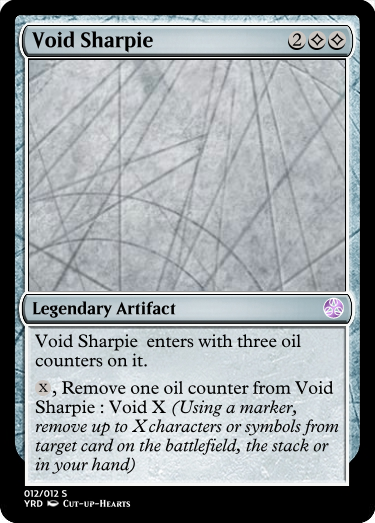
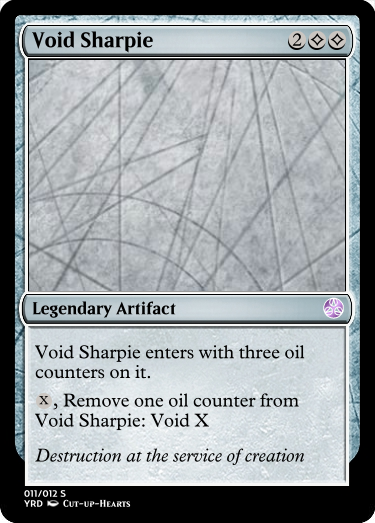
I should also add a rule to allow restoration afterwards if needed.
Something like :
-
When using a marker to void a card, make sure you mark a sleeve the card is in.
Removing the sleeve should remove the marks. (allowing reversal of the void)
Oct 2025
Since last time, the set Edge of Eternities introduced a void mechanic.
One that has nothing to do with what I was imagining.
So I'm using the keyword redact instead.
I've made and preventively added a card to enable restoring, as I was talking about before.
Then finally finished this sharpie idea, next time I have the occasion, I'll add it to the deck.
Might not be perfect but I figured hte best way to know is by playing with it.
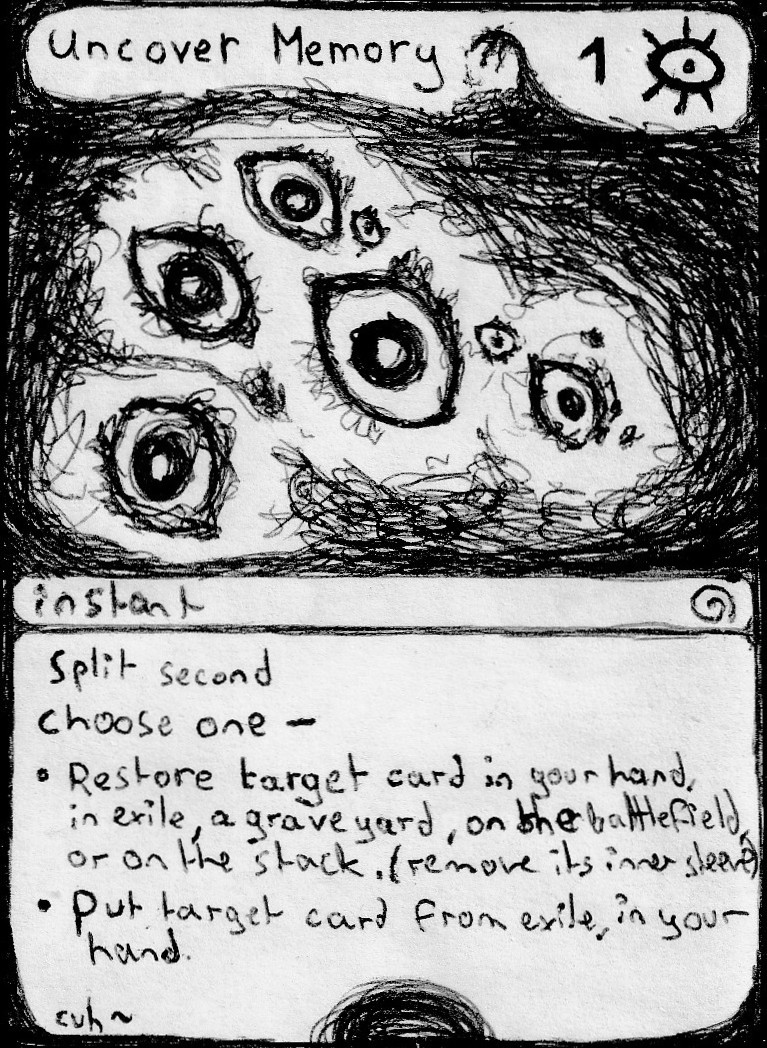
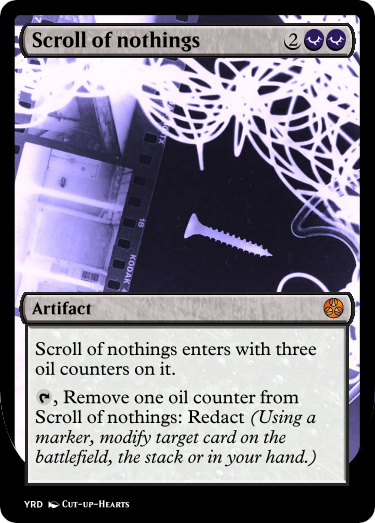
Meta Supertype
Oct 2025
For now the Wyrd-box is becoming a beautiful mismatch of pieces and ideas, and I love it.
But still quite "fair" in the sense that it's a shared source.
I seek something more. I have decided that it is time to introduce more asymetry !
I want players to be able to start building domains around the wyrd.
Using pieces from it or drawing from other sources entirely.
With that in mind, I am introducing a Meta supertype.
Last time I played, I added those rules in the book :
Meta Supertype :
- At the start of a game players can put down Meta permanents on the battlefield.
- When a game ends Meta cards return to their owner outside of the deck.
As often with this game, we'll see where it goes.
But I am quite excited about this new horizon.
I made myself a toolbox to manage cards more freely during games
Though I am giving myself more power, I expect others to do the same.
Very curious about what will be born from this loss of balance.
And it's also opening the door to plugins and programs that could be installed during games.
Here are some of the cards I am making for that :
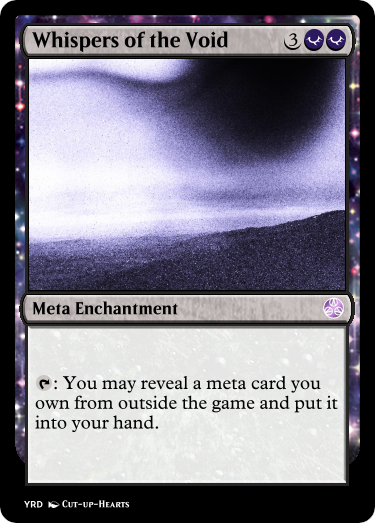
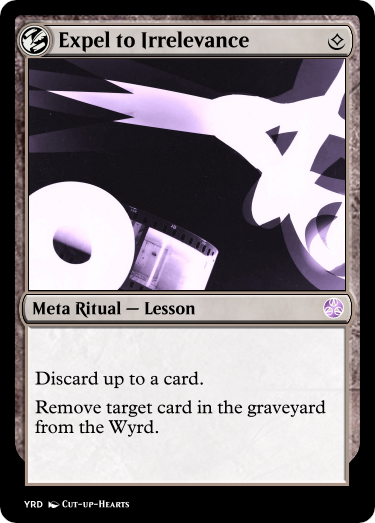
I also made Meta versions of the base wyrd cards to have a versatile toolbox to mess with things.